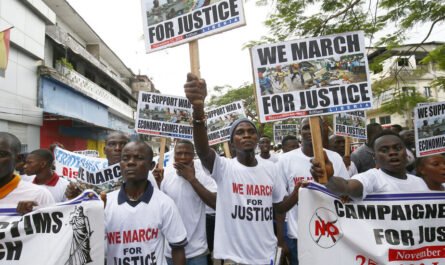Hezbollah replied on Thursday to Israeli airstrikes in Lebanon with a second straight day of sharply ramped-up rocket and drone assaults on Israel, in an intensifying conflict that has raised fears of a full-fledged war.
How many weapons Hezbollah launched on Thursday was unclear, but the group’s Al-Manar broadcaster reported that at one point, more than 100 were fired in a simultaneous, coordinated attack aimed at several Israeli military installations. That included a number of drones aimed at Israel’s northern military headquarters, Hezbollah said.
Israel’s military said in the afternoon that Hezbollah had sent more than 40 rockets across the border, but the barrage continued well into the evening. Hours later, the military had not updated that number, but a military spokesman called it the most serious attack since the war between Israel and Hamas began in October. He did not immediately elaborate.
At least four people were injured in Thursday’s assault, according to both Israel’s military and its emergency service, Magen David Adom. The military said in the afternoon that its air defenses had shot down many of the weapons fired up to that point, but some had penetrated. The attacks and counterattacks ignited wildfires on both sides of the border.
On Thursday night, Lebanon’s state-run news agency reported that an Israeli strike destroyed a house, caused several casualties and started a fire in the town of Jannata, Lebanon, a few miles from the coastal city of Tyre.
On Tuesday, an Israeli strike targeted and killed Taleb Abdullah, one of the senior commanders of Hezbollah, a powerful armed group and political faction backed by Iran. The group pledged to step up its attacks on Israel in retaliation.
On Wednesday, Hezbolllah fired more than 200 rockets at Israel, according to the Israeli military, but they did minimal damage.
The Israeli military said on Thursday that its fighter jets had struck “Hezbollah military structures” overnight, in Lebanese border villages.
After the Hamas-led assault on Israel on Oct. 7, and Israel’s retaliatory campaign in the Gaza Strip, Hezbollah stepped up its attacks against Israel, which replied with artillery and airstrikes into Lebanon, raising a long-simmering conflict closer to a boil.
The near-daily strikes have forced more than 150,000 Israelis and Lebanese living near the border to flee their homes.
Israeli officials have threatened stronger action against Hezbollah, and pressure to do so — from the political right and from displaced civilians — has been rising. But so far both sides have stopped well short of full-blown war.
Israel killed Mr. Abdullah in a strike on Tuesday night in Jwaya, in southern Lebanon, saying he had “planned, advanced and carried out a large number of terror attacks against Israeli civilians.”
The United States, France and other mediators, warning of the danger of a regional war, have sought to advance a diplomatic settlement between Israel and Hezbollah that could restore calm on both sides of the border. But analysts say the likelihood of an agreement is low as long as Israel’s eight-month-long campaign in Gaza persists.
Israel invaded Lebanon in 1978, 1982 and 2006, each time to push back militant groups that were launching attacks into Israel.
Johnatan Reiss contributed reporting.



